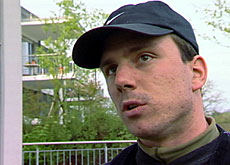Rightwing demo puts extremists in spotlight

The public appearance of Nazi skinheads during Switzerland’s National Day celebrations has put the issue of extremism back in the spotlight.
But an expert on extremist activities in Switzerland has played down reports that an increasing number of women are joining far-right groups.
Hans Stutz’s comments come after police and observers said many more women than in previous years were among the militants who disrupted the Swiss president’s National Day speech on the Rütli meadow.
According to Stutz, a journalist who monitors the rightwing scene on behalf of the Foundation against Racism and Anti-Semitism, women make up only one in four or five people who appear at far-right public gatherings.
He adds that the figure has remained stable for years and is unlikely to change considerably in the near future.
Stutz also points out that – apart from one or two exceptions – they play no major role within rightwing groups.
swissinfo: What do you know about the background of the women who join rightwing extremist groups in Switzerland?
Hans Stutz: We know very little about these women and extremist groups in general. The few established facts are valid for both male and female members or followers of these groupings.
Most of them come from rural and conservative backgrounds or small towns. Generally speaking these people haven’t had much education and are often in menial or low-skilled jobs.
swissinfo: What is the particular attraction of rightwing extremism for women?
H.S.: It is the same for men and women – racism, xenophobia, intolerance towards liberalism or simply anything that goes against their views.
It is possible that other factors play a part. You could see it as a form of youth protest against the establishment. Or in the case of women there might be an element of fascination for certain male leaders of the group.
Many supporters disappear from the rightwing scene after a while when they get to a certain age and maybe have a family. But their political beliefs remain the same.
swissinfo: What sort of impact will rightwing militants –with or without women – have in the near future?
H.S.: There are certain indications that they will gain in importance or at least not become weaker.
But a single rightwing incident which leads to negative headlines can halt the progress of extremists, albeit temporarily. It was noticeable how the 2001 murder case of a young gang member by Nazi skinheads in Interlaken led to a sudden drop in the number of people getting involved in rightwing extremism.
swissinfo: What role do the Swiss media play in the coverage of extremism and racism?
H.S.: The media tend to ignore or play down extremism, racism or violence against foreigners or leftwing supporters in the country.
It is also a fact that the media like to hype up extremism on certain occasions, notably around National Day and the celebrations on the Rütli meadow. But the issue disappears from the front pages as swiftly as it hits them. The unspoken rule seems to be: make a big noise and then forget the whole thing.
swissinfo: How should the media report on extremism?
H.S.: I think there can’t be enough critical publicity about rightwing extremism. Militants do not like to be in the news, unless they are given a platform.
They shy away from too much exposure which could lead to public pressure and they rarely talk to journalists. Rightwing militants prefer to remain anonymous.
But critical reporting is also vital for efforts to fight Nazi skinheads. It is a way of informing the public about potentially dangerous organisations and individuals who prefer to operate in the semi-dark.
swissinfo-interview: Urs Geiser
There are an estimated 1,000 rightwing extremists in Switzerland, according to the federal police authorities.
Expert Hans Stutz believes that up to 250 women can be considered supporters of extremist groups, but only one or two women play an active role.
He rejects suggestions that the number of militant women has increased significantly over the past few years.

In compliance with the JTI standards
More: SWI swissinfo.ch certified by the Journalism Trust Initiative











You can find an overview of ongoing debates with our journalists here . Please join us!
If you want to start a conversation about a topic raised in this article or want to report factual errors, email us at english@swissinfo.ch.